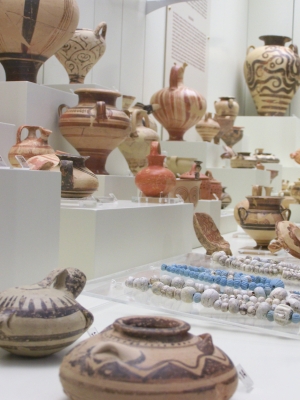Achilles' wrath, to Greece the direful spring
Of woes unnumber'd, heavenly goddess, sing!
That wrath which hurl'd to Pluto's gloomy reign
The souls of mighty chiefs untimely slain;
Whose limbs unburied on the naked shore,
Devouring dogs and hungry vultures tore.
Since great Achilles and Atrides strove,
Such was the sovereign doom, and such the will of Jove!
The opening stanza of the Iliad [trans. by William Cowper] (Homer)
In 1873, carrying his worn copy of the Iliad, Henrich Shliemann, an amateur German archaeologist, discovered Troy. While the gold work he found dated to a Troy 1300 years prior to the Troy of the Iliad, later archaeologists confirmed the site as the location of the Trojan War (Rosenberg 108).


Photo by De'Lara Stephens, March 2006
The Iliad does not record the entire Trojan War, but focuses on a conflict that arises between Agamemnon and Achilles in the ninth year of the war (Harris and Platzner 365). Agamemnon has taken Achilles' prize of honor, humilating him, and Achilles withdraws from the battle with his Myrmidon soldiers. Without Achilles' help, the war goes badly for the Greeks. Finally, Patroclus, Achilles' close friend, dons Achilles' armor and enters the fray, but is killed by Hector, a Trojan hero and prince. Grief-stricken, Achilles returns to the war and kills Hector, ensuring his own death.
Homeric Hero
Above all else, the Homeric hero seeks aretê, the striving for excellence, "the power to achieve the fullest performance" (Kerferd 148). The Homeric hero emphasizes strength, competition (Keferd 148), courage (Kerferd 148; Rosenberg 119), moral responsibility, Intelligence, insight, ingenuity, and superiority in warfare (Rosenberg 119). The hero's worth is recognized through the preservation of his exploits in poetry, public approval, and his prize of honor, frequently a female captive taken in battle. This honor, value attached to someone, or public acknowledgement of value (timé) was a matter of glory, fame, and lasting reward (kleos) (Kiely). Honor denied, however, brings great shame (Rosenberg 120). In his struggle for excellence, the hero must avoid hubris, or excessive pride (often the result of menin - wrath). If he succumbs to pride, he is prone to até, "blind, rash behavior" and will suffer retribution, nemesis (Rosenberg 122).
Achilles must chose between a normal, average life or a glorious death (Harris and Platzner 365). His withdrawal from battle costs him the life of his closest friend. In the end, he must choose between loyalty to an individual and loyalty to society (Rosenberg 120). Achilles is the "first tragic hero in literature" (Rosenberg 121) because he struggles with these very human choices. Agamemnon, leader of the Greek army, is only concerned about outward signs of honor and survives the war (Harris and Platzner 366). Hector places loyalty to family over what is right, supporting his brother's love for and abduction of Menelaus' wife Helen, allowing Paris' action to draw Troy into war (Rosenberg 120-1).
